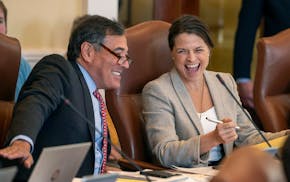When Justice Alan Page isn't opining from Minnesota's most prestigious bench, the Hall of Fame football star makes thousands of dollars speaking about legal affairs and signing autographs at sports-card shows.
In 2012, that amount was $49,570.94, the most for any Minnesota Supreme Court justice or Court of Appeals judge.
Compensation for nonjudicial activities is legal and must be filed annually with the State Court Administrator's Office. But Minnesota is one of just a few states where the reports aren't available online and can only be viewed in person.
The Legislature recently toughened those disclosure requirements. Starting in January, new and reappointed judges at all levels will need to list investments, locally owned real estate and even involvement in horse racing, and the information will be made broadly public.
Not everybody in a black robe earns additional cash. Fewer than half of Minnesota's 26 Supreme and Appeals court justices and judges received extracurricular compensation in 2012, and for one judge, the grand total was a $25 gift card for speaking to the state bar association.
A Minnesota Supreme Court justice's annual salary is $151,820; a Court of Appeals judge earns $143,054.
"It certainly makes sense that those in judicial roles disclose sources of income beyond what they directly receive in salary," said Bert Kritzer, a law professor at the University of Minnesota.
This month, the Center for Public Integrity, based in Washington, D.C., evaluated disclosure rules nationwide for judges in the highest state courts. The overall level of disclosure in the 50 states and the District of Columbia was called poor, with 43 (including Minnesota) received failing grades.
The report added, however, that Minnesota's grade will improve once the new disclosure requirements take effect.
The report also contained each state's disclosure forms for its Supreme Court justices. Only three justices from North and South Dakota, Iowa and Wisconsin claimed extrajudicial compensation in 2012.
"Each state's disclosure system has to be evaluated independently," said Cynthia Gray, director of the American Judicature Society for Judicial Ethics in Nashville. "I found the center's report very interesting, but there wasn't anything in it I found shocking."
Abiding by the code
Minnesota has an unusual situation in having someone on its Supreme Court as well known as Page, who played defensive tackle with the Minnesota Vikings and graduated from the University of Minnesota School of Law, Kritzer said.
A speech to the Kansas Bar Association earned Page $10,000. But being a judge isn't necessarily the source of his demand for speaking engagements and autograph card shows, Kritzer said wryly.
"He lived a life prior to becoming a justice," Kritzer said. "We can't say you have to give it all up once you are on the bench."
Two other justices from the seven-member state Supreme Court, David Stras and G. Barry Anderson, also received extrajudicial compensation. Stras earned nearly $14,000, most of which came from teaching a course at Vanderbilt University in Nashville. Anderson was paid most of his $3,250 for hosting a regular public affairs program called "Your Legislators" for Pioneer Public Television.
When asked to comment on their compensation, the justices asked that a copy of the Code of Judicial Conduct be provided as a response, according to the State Court Administrator's Office. The code states that judges may accept reasonable compensation for extrajudicial activities and that it has to be reported. Judges also must disqualify themselves from any case in which the judge's impartiality might reasonably be questioned.
Classes, weddings, speeches
The Court of Appeals has 19 judges. The six who accepted nonjudicial compensation in 2012 all said they had no reservations about doing so.
Judge Carol Hooten had the highest amount at $1,715, all from performing weddings as a district judge before she became an appellate judge. She said she no longer performs weddings. She also received $100 as an adjunct professor at William Mitchell College of Law in St. Paul; she donated it to the college.
Judge Thomas Kalitowski earned $1,500 from the University of Minnesota law school for co-teaching a fall semester seminar on appellate advocacy in 2012 and 2013. Judge John Rodenberg reported about $600 in 2012 for teaching at William Mitchell, performing weddings for friends and speaking to the Brown County Master Gardeners about pruning and grafting apple trees.
Several judges also recorded reimbursement payments, even though they weren't sure they needed to be included in the disclosure reports.
Security concerns have been raised about judges having to disclose detailed financial information, said Gray of the Society for Judicial Ethics. While that's important, it shouldn't be the deciding factor, he said.
Several states limit the amount of money a judge can earn from extrajudicial activities, but Kritzer said he's reluctant to endorse such a limit. He did question whether financial disclosures should include a judge's spouse, partner, unmarried partner, children and siblings to prevent possible conflicts of interest.
"It's hard to decide where it should end," he said.
David Chanen • 612-673-4465
The Latest | Seated juror in hush money trial excused as prosecutors ask judge to sanction Trump
Former Wisconsin Democratic Rep. Peter Barca announces new bid for Congress

